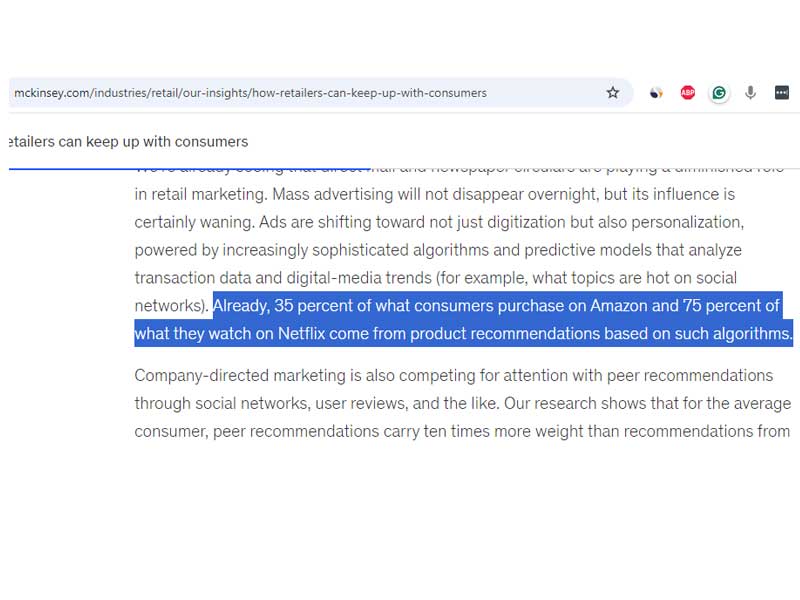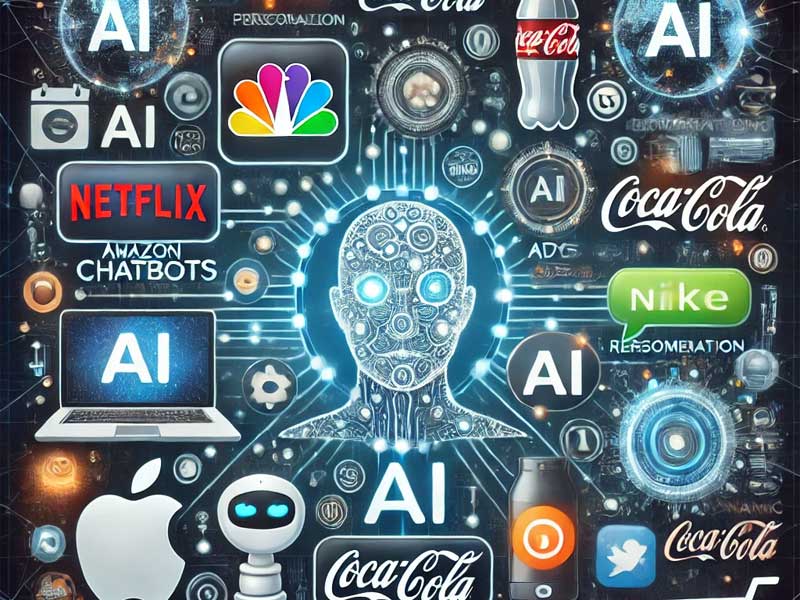Marketing sector is one such domain which is time-consuming, laborious and requires lots of trial and error. With the progression of AI technology, companies are integrating AI. From personalized customer experiences to automated ad targeting, AI is empowering brands to engage and retain their consumers in ways that was never seen before.
In this article, we highlight the top 4 AI marketing examples by big companies showcasing how they are leveraging AI to drive innovation, optimize campaigns, and enhance engagement.
Amazon
Being a leader in retail sector rarely happens without innovative methods. Amazon understood this years ago and started integrating AI in its retail sector.
Not just retail, they use artificial intelligence across various aspects of its business in order to provide a personalized experience to the user.
If you are an ardent Amazon shopper, you must have experienced personalzied recommendations that highly appeal you. Amazon does this through AI which ensures a very signifcant revenue for the company.
Its AI-powered recommendation engine is crucial for its marketing strategy. Research from McKinsey shows that 35% of Amazon’s revenue is driven by AI-based product recommendations . (PHOTO)

Collaborative filtering and deep learning models helps Amazon to analyze customer’s likings. Whenever a consumer browses Amazon, the algorithms take cues from the browsing history, purchase history, and items in the shopping cart. These insights allow Amazon to recommend products tailored to individual customers.
Imagine looking for running shoes on Amazon. Its likely that you will look for other related items also such as athletic apparel or running accessories. This is exactly how Amazon utilizes AI to increase customer engagement.
Moreover, Amazon uses AI for dynamic pricing, adjusting prices based on demand, competition, and customer buying patterns. This dynamic pricing model increases conversions while maximizing revenue.

Thats not all. Amazon also uses AI to automate its email campaigns. The AI algorithm predict when to send emails and what type of content will most appeal to users, resulting in higher open and conversion rates. These techniques, combined with Amazon’s AI-driven supply chain management, contribute to its market dominance.
Nike
Nike realized long time ago that people have hard time in identifying the correct shoe size for themselves.
“Fit is such a big friction point for our customers,” said Michael Martin, Nike’s global head of digital products said in 2019
To solve this problem, Nike introduced the Nike Fit feature in its app which uses computer vision and machine learning to help customers find their correct shoe sizes. This tool scans customers’ feet using their smartphones and provides accurate sizing recommendations, thus reducing the likelihood of returns due to incorrect sizing.

Nike is also using AI to understand the customer’s preferences based on their past purchases and browsing behavior. Nike’s AI-driven product recommendations have increased conversion rates by 40%, according to a company report.
When it comes to inventory management and product demand forecasting, NIke is using AI in those departments also. They use machine learning to analyze purchasing patterns and predict which products will be in high demand, allowing the company to optimize its supply chain.
Coca-Cola
A product is as good as the perception of its consumer. Coca-Cola cannot afford to significantly alter its iconic taste, as it has been beloved by consumers for decades and is central to the brand’s identity. But it has started to use AI to enhance customer engagement and create personalized experiences.
AI helped Coca Cola in increased retail revenue through push notifications.

One of the company’s most notable AI applications was the WhatsApp Business platform the company created in 2019 that helped small Brazilian retailers that enabled them to earn 22% more sales as compared to the time when telesales were used.

Coca Cola have reported steady increase in its growth especially since 2023 when they started to integrate AI in their marketing strategies and digital initiatives.

NetFlix
Netflix thought of an out of box idea of delivering short-form of trailer considering that most viewers these days have lower attention span. They started micro-targeted advertisement which enabled them to advertize the trailers in micro way of like 5 to 15 seconds. The aim was to showcase a trailer of the content that is likely to be watched by the viewer later on instead of trying to retain the subscriber with the conventional 2 or 3 minutes long trailer.
According to the streaming giant, nearly 80% of the content watched by its users comes from AI-powered recommendations. NetFlix uses AI to understand the genre of content which its consumer prefers. By recommending appealing content, the company is able to retain most of its subscribers.
But thats not all. Netflix also deploys AI in its marketing campaigns through personalized email recommendations, trailer creation, and even predicting user churn.
One of the major problems that Netflix suffers over the years is account sharing. Simply put, account sharing allows more people to access Netflix account than who have paid for it. With the help of AI, Netflix has significantly detected account sharing.


Source : – Wifitalents
Conclusion
AI has become an indispensable tool these days. And its progression seems inevitable. Modern marketing, empowering brands to deliver highly targeted, personalized, and efficient campaigns. The top 4 examples discussed highlight how AI is revolutionizing the marketing landscape, offering companies new ways to understand customers, predict trends, and drive performance.



